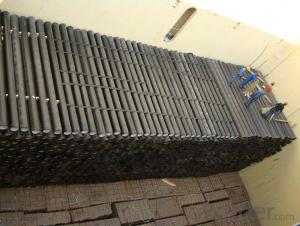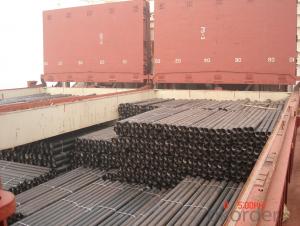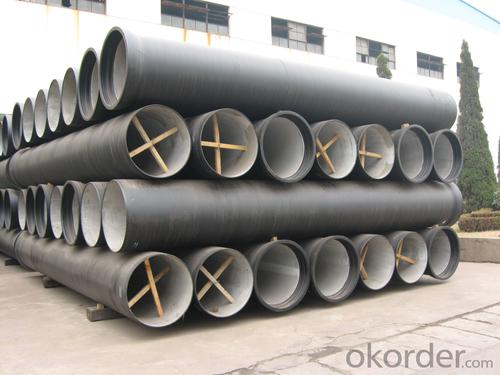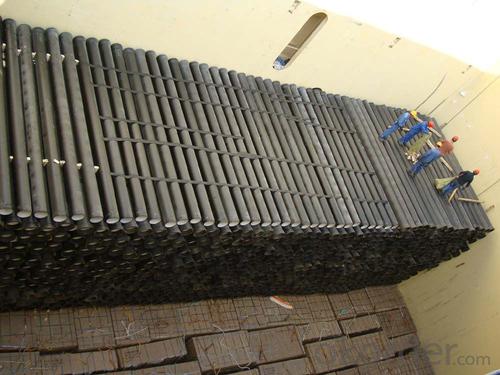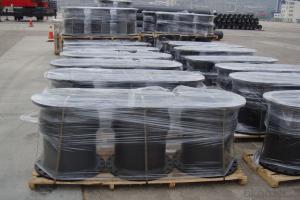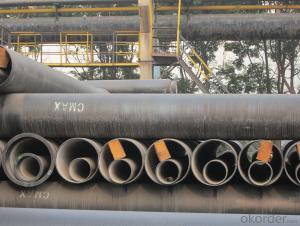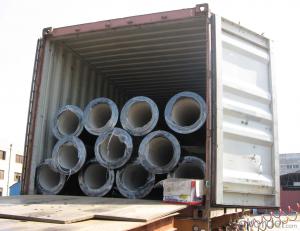DUCTILE IRON PIPE DN600 C
- Loading Port:
- China Main Port
- Payment Terms:
- TT OR LC
- Min Order Qty:
- -
- Supply Capability:
- 30000tons m.t./month
OKorder Service Pledge
OKorder Financial Service
You Might Also Like
Specification:
1) The standard of pipe: ISO2531:1998, K9
2) Effective length: 6m
3) Inner cement line: Portland cement line as per ISO4179
4) Zinc coating: at least 130g/m2 as per ISO8179
5) Bitumen painting: at least 70um as per ISO8179
6) With 100% quantity of NBR ring, or SBR ring, or EPDM ring as per ISO4633
7) DN80mm-800mm
8) High strength, lighter than grey iron, good corrosion resistance, no furring, small flow resistance, easy fixing, long life tome about 100 yeas
9) Produced by Hangzhou chunfeng machine
10) Checked by automatic inspection equipment
11) Composition:
Chemical composition | | | | |||
Chemical composition | Ductile Cast Iron Pipe (%) | Grey iron pipe (%) | Steel pipe (%) | | | |
C | 3.5-4.0 | 3.2-3.8 | 0.1-0.2 | | | |
Si | 1.9-2.6 | 1.4-2.2 | 0.15-0.4 | | | |
Mn | 0.15-0.45 | 0.4-0.6 | 0.3-0.6 | | | |
P | ≤0.06 | ≤0.3 | 0.02-0.03 | | | |
S | ≤0.02 | ≤0.1 | 0.02-0.03 | | | |
Mg | 0.03-0.06 |
|
| | | |
12) Feature:
Mechanical properties | | | | |||
| Ductile Cast Iron Pipe | Grey Iron Pipe | Steel Pipe | | | |
Tensile Strength(Mpa) | ≥420 | 150-260 | ≥400 | | | |
Yield Strength(Mpa) | ≥300 | No Confirmation | No Confirmation | | | |
Bending Strength(Mpa) | ≥590 | 200-360 | ≥400 | | | |
Elongation (%) | ≥10 | Neglected | ≥18 | | | |
Brinell Hardness(HBS) | ≤230 | ≤230 | About 140 | | | |
13) T type mechanical joint
14) Packing: in bulk or container
- Q: What is the expected joint deflection capability of ductile iron pipes?
- The expected joint deflection capability of ductile iron pipes can vary depending on several factors. However, in general, ductile iron pipes have a higher joint deflection capability compared to other types of pipes. The joint deflection capability refers to the ability of a pipe joint to accommodate angular deflection or misalignment during installation or due to ground movement. Ductile iron pipes are known for their flexibility, which allows them to withstand external forces and movements without compromising their structural integrity. The expected joint deflection capability of ductile iron pipes typically ranges from 1 to 5 degrees, depending on the pipe diameter and wall thickness. This means that the pipes can safely accommodate angular deflection within this range without causing leakage or failure. It is important to note that the joint deflection capability can also be influenced by factors such as the type and quality of the joint restraint system, soil conditions, installation techniques, and pipe alignment. Proper installation practices and adherence to manufacturer guidelines are crucial in ensuring optimal joint deflection capability. Overall, ductile iron pipes are designed and manufactured to have a significant joint deflection capability, making them suitable for a wide range of applications, including water distribution, sewer systems, and industrial piping networks.
- Q: Can ductile iron pipes be used in areas with high groundwater levels?
- Indeed, areas with high groundwater levels can accommodate the use of ductile iron pipes. Renowned for their robustness, endurance, and anti-corrosion properties, these pipes prove themselves suitable for diverse purposes, such as water supply systems. Their structural integrity remains intact even when confronted with elevated groundwater levels. Additionally, the smooth interior surface of ductile iron pipes aids in sustaining optimal flow capacity while minimizing the likelihood of blockages or sediment accumulation. Thus, they offer a dependable option for regions with considerable groundwater levels, ensuring a durable and effective resolution for water distribution systems.
- Q: Are ductile iron pipes resistant to corrosion?
- Ductile iron pipes possess resistance against corrosion, indeed. Ductile iron, a variant of cast iron, undergoes treatment with additional substances to enhance its flexibility and durability. These substances, like graphite, magnesium, and cerium, form a protective barrier on the pipe's surface, rendering it highly resistant to corrosion. Furthermore, ductile iron pipes are frequently coated with either cement mortar or a fusion-bonded epoxy coating, thereby augmenting their resistance against corrosion. This attribute renders ductile iron pipes suitable for a range of applications, including water distribution, wastewater treatment, and industrial pipelines, where corrosion is commonly encountered.
- Q: Are ductile iron pipes suitable for underground applications?
- Yes, ductile iron pipes are suitable for underground applications. Ductile iron pipes are known for their durability, strength, and corrosion resistance, making them an ideal choice for underground installations. These pipes can withstand heavy loads, ground movement, and external pressure, making them suitable for burying underground. Additionally, ductile iron pipes have a long lifespan, often lasting more than 100 years, which is crucial for underground applications where accessibility and maintenance can be challenging. Overall, their robustness and longevity make ductile iron pipes a reliable and suitable choice for underground applications.
- Q: Are ductile iron pipes suitable for installation in rocky or hard soil conditions?
- Yes, ductile iron pipes are suitable for installation in rocky or hard soil conditions. Ductile iron pipes are known for their strength and durability, making them well-suited for challenging soil conditions. Their high tensile strength allows them to withstand external loads and pressures, including the presence of rocks or hard soil. Additionally, ductile iron pipes are resistant to corrosion, which further enhances their suitability for installation in such conditions. The pipes' flexibility and ability to withstand bending stresses also make them a reliable choice for rocky or hard soil conditions, as they can accommodate ground movement without compromising their structural integrity. Overall, ductile iron pipes are a preferred option for installations in challenging soil conditions due to their robustness, longevity, and resilience.
- Q: Are ductile iron pipes suitable for use in cooling water systems?
- Ductile iron pipes are indeed appropriate for utilization in cooling water systems. They exhibit remarkable strength and durability, rendering them impervious to the intense pressure and corrosive properties inherent in such systems. Furthermore, they possess the ability to withstand extreme fluctuations in temperature while delivering enduring performance. Additionally, ductile iron pipes exhibit commendable resistance to the proliferation of microorganisms, a crucial aspect in preserving the quality of the cooling water. Moreover, these pipes facilitate effortless installation and necessitate minimal maintenance, thereby constituting a cost-effective alternative for cooling water systems. In summary, ductile iron pipes represent a dependable and suitable choice for employment in cooling water systems.
- Q: How do ductile iron pipes handle differential settlement?
- Ductile iron pipes are known for their exceptional durability and ability to withstand various environmental conditions, including differential settlement. Differential settlement refers to the uneven settling of the ground, which can often lead to stress and strain on underground pipes. Ductile iron pipes are specifically designed to handle such settlement issues due to their inherent flexibility and strength. These pipes have the ability to flex and accommodate slight ground movements without causing significant damage or failure. The flexibility of ductile iron pipes allows them to distribute the stress and strain caused by differential settlement more uniformly along their length. This feature helps prevent concentrated stress points that could potentially lead to cracks or fractures in the pipe. Additionally, the inherent strength of ductile iron pipes provides them with the necessary resistance to withstand the forces generated by differential settlement. The pipes' robust construction and high tensile strength make them less susceptible to deformation or damage caused by ground movements. Furthermore, ductile iron pipes are commonly installed with flexible joints, such as rubber gaskets or push-on joints. These joints allow for some movement and accommodate any slight misalignment or settlement that may occur. By providing flexibility at the joints, the pipes can better adapt to changes in ground conditions and reduce the risk of failure. In summary, ductile iron pipes are well-equipped to handle differential settlement due to their flexibility, strength, and the use of flexible joints. These features ensure that the pipes can withstand ground movements and continue to function effectively without compromising their integrity or longevity.
- Q: Which is good for water polo cast iron pipe steel pipe?
- The advantage of ductile iron pipe is cheap, corrosion resistance, lack of toughness is poor, not easy to process
- Q: Method for cutting large diameter ductile iron pipe
- When the oxygen and acetylene volume ratio is greater than 1.2, is formed. As more oxygen, burning, the flame length is shortened obviously, cone tapered inner flame almost disappeared, and a strong desire. Making due to oxygen, the oxidation of metal, so are not widely used, only used for welding of brass, to prevent evaporation of zinc.
- Q: Are ductile iron pipes suitable for use in seismic areas?
- Ductile iron pipes are indeed appropriate for usage in seismic regions. The strength and durability of ductile iron enable it to endure seismic forces and ground motions linked to earthquakes. Its exceptional flexibility and high tensile strength provide resistance against cracking or fracturing in highly challenging circumstances. Furthermore, ductile iron pipes have exhibited their trustworthiness and appropriateness in seismic zones over an extensive period. Nevertheless, to optimize their efficiency and mitigate any probable risks, it is crucial to adhere to appropriate installation methods and seismic design principles.
Send your message to us
DUCTILE IRON PIPE DN600 C
- Loading Port:
- China Main Port
- Payment Terms:
- TT OR LC
- Min Order Qty:
- -
- Supply Capability:
- 30000tons m.t./month
OKorder Service Pledge
OKorder Financial Service
Similar products
Hot products
Hot Searches
Related keywords

